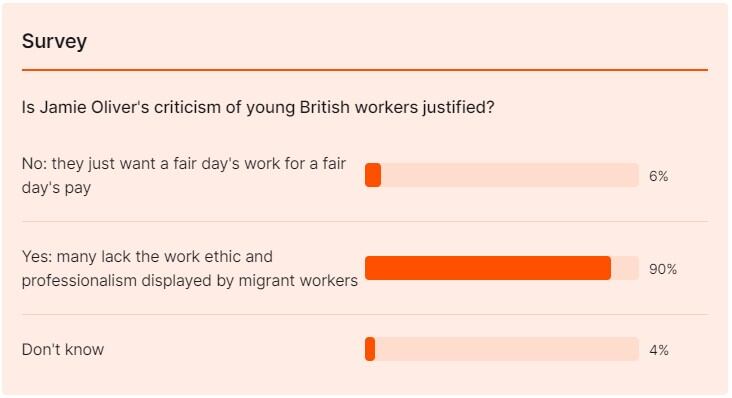After controversial remarks about low-income families choosing “massive TVs” ahead of healthy diets, Oliver next trained his sights on young British workers.
In an interview with Good Housekeeping magazine, the 38-year-old, millionaire celebrity chef claimed: “British kids particularly, I have never seen anything so wet behind the ears!
“I have mummies phoning up for 23-year-olds saying to me, ‘My son is too tired’. On a 48-hour-week! Are you having a laugh?”
Oliver went on to say that without migrant workers, all his restaurants would close tomorrow because there would be no British workers to replace them.
‘Much stronger, much tougher’
“I think our European immigrant friends are much stronger, much tougher,” he said.
EU employment laws specifying a 48 hour working week represented only “half a week’s work”, added Oliver. But some British employees “still whinge about it”.
The TV chef’s praise for migrant workers was echoed by R&R Ice Cream, Europe’s largest own-label ice cream manufacturer.
Peter Pickthall, group HR director at R&R Ice Cream, told FoodManufacture.co.uk that the firm employed about 30 different nationalities at its Leeming Bar site alone.
“Our jobs are open to all, but it is primarily foreign nationals that apply which is down to their work attitude and ethic,” said Pickthall. “They want to work, which means that sickness and absence rates have reduced dramatically. At R&R, they are currently under 3% which is a very low figure for the food industry.”
Migrant workers were happy to work overtime and willing to learn, added Pickthall.
Happy to work overtime
“Many foreign nationals are very well educated, so we benefit from their skills, which improves productivity while they also understand the technicalities of the job. That enhances innovation, efficiency and effectiveness.”
R&R Ice Cream accepted that some staff will stay only for two to three years, but during that time their input to the business was “invaluable.”
But a number of young people contacted BBC’s Newsbeat programme in defence of young British workers. Michelle Flavell said: “How can a young British person work if all the jobs are given to immigrants?”
Meanwhile, earlier this year Fiona Kendrick, the boss of Nestlé UK, claimed few would-be engineers were “willing to really roll up their sleeves” and engage with unskilled and semi-skilled operators. Speaking at the launch of the degree course in Sheffield, she slammed some youngsters’ lack of interpersonal skills and food industry knowledge.
'Lack of technical ability'
“When we went to talk to employees, they said they found [in potential recruits] a lack of technical ability combined with commercial acumen,” she said.
Last year Jack Matthews, former chief executive of Improve, the sector skills council and the National Academy for food and drink, told Food Manufacture’s HR Forum that the industry was too reliant on migrant labour.
“About 30% of our jobs [in the food and drink sector] are filled by migrant workers. In some cases that rises to the upper 80 percents in the fish processing plants along the Humber esturary. We need to address our dependency on migrant workers in food production.”
What's your view? How to do you think migrant workers compare with their British counterparts? Share your views in our quiz.

